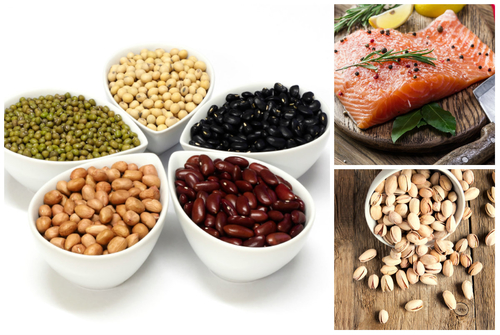 Lacking sleep? If you’re looking to improve sleep quality, there are certain foods you should include in your diet.
Lacking sleep? If you’re looking to improve sleep quality, there are certain foods you should include in your diet.
When it comes to overall fitness and fat loss, sleep is one of the keys to success. Sleep allows your body to recover and regenerate, getting you ready for the day ahead, and if you’re not getting the recommended seven to nine hours of sleep per night, you’ll have a much harder time reaching your fitness goals.
And sleep’s reach is far greater than fitness alone. Quality sleep helps improve mood, cognitive function, and concentration, while limiting stress. It also helps control cortisol (the stress hormone), which in turn plays a role in controlling appetite. An increased cortisol level is also a big factor in your body’s propensity to store fat, especially in the belly.
So how can you improve sleep quality? The answer lies, perhaps surprisingly, in your stomach.
Improve Sleep Quality and Boost Your Energy Levels!
Food can impact sleep quality, and there are a few items in particular that can have some real benefits. These nutrient-rich foods can help improve sleep and heart health, boost energy levels, and allow you to experience better fitness goals.
1. Salmon: Known for its heart-healthy omega-3s and muscle-building protein, salmon can also help you get some well-deserved shut-eye. Research has shown that eating salmon three times per week for a period of six months can help people reach restorative deep sleep more quickly than those who got more of their protein from chicken, beef, or pork.
The research also showed that people who ate salmon had a more regular heartbeat and higher levels of vitamin D in their blood. Vitamin D is known to influence sleep quality and quantity, and salmon is a great source of this valuable nutrient. A three-ounce serving contains 600–1,000 IU.
2. Beans: The benefits of fiber are well-documented when it comes to cholesterol, heart health, and digestion, but there is also evidence that it can play a big role in sleep quality. A study released earlier this year indicates that a high-fiber diet lengthens the amount of time spent in slow-wave sleep, which is the stage of deep sleep that is particularly restorative. Spending more time in this stage can help with muscle, brain, and tissue recovery. Fiber also improves the way your body metabolizes and uses blood glucose, which can also have positive impacts on sleep.
Beans in any form are a great source of fiber, and a half-cup provides 15 grams—that’s almost 50% of your daily recommended intake.
3. Pistachios: Tasty and packed with protein and healthy fats, these nuts can also help improve your sleep. With a couple of handfuls per day, you’ll get enough vitamin B6 to help produce serotonin (a neurotransmitter) and melatonin (a hormone), both of which are associated with better sleep.
Of course, portion control can be really difficult when it comes to pistachios. To keep things in check, instead of eating them by themselves, add them to a salad or, if you have pistachio butter, spread no more than two tablespoons’ worth on whole-grain crackers, toast, or apple slices.
When it comes right down to it, your life is better when you get a good night’s sleep. Eat these foods to improve your slumber and experience the multitude of benefits that come along with it.
Sources for Today’s Article:
St-Onge, M. P., et al., “Sleep restriction leads to increased activation of brain regions sensitive to food stimuli,” The American Journal of Clinical Nutrition, 2012; 95(4), 818-824.
Hansen, A. L., et al., “Fish consumption, sleep, daily functioning, and heart rate variability,” Journal of Clinical Sleep Medicine: JCSM: Official Publication of the American Academy of Sleep Medicine, 2014; 10(5), 567.
Dahlquist, D. T., et al., “Plausible ergogenic effects of vitamin D on athletic performance and recovery,” Journal of the International Society of Sports Nutrition, 2015; 12(1), 1-12.
Lu, Z., Chen, et al., “An evaluation of the vitamin D 3 content in fish: is the vitamin D content adequate to satisfy the dietary requirement for vitamin D?,” The Journal of Steroid Biochemistry and Molecular Biology, 2007; 103(3), 642-644.
St-Onge, M. P., et al., “Fiber and Saturated Fat Are Associated with Sleep Arousals and Slow Wave Sleep,” Journal of Clinical Sleep Medicine: JCSM: Official Publication of the American Academy of Sleep Medicine; 2015.
Peuhkuri, K., et al., “Dietary factors and fluctuating levels of melatonin,” Food & Nutrition Research, 56; 2012.
Kadey, M., “5 Best foods to help you sleep better,” Bodybuilding.com, March 18, 2016; http://www.bodybuilding.com/fun/5-best-foods-to-help-you-sleep-better, last accessed March 29, 2016.
